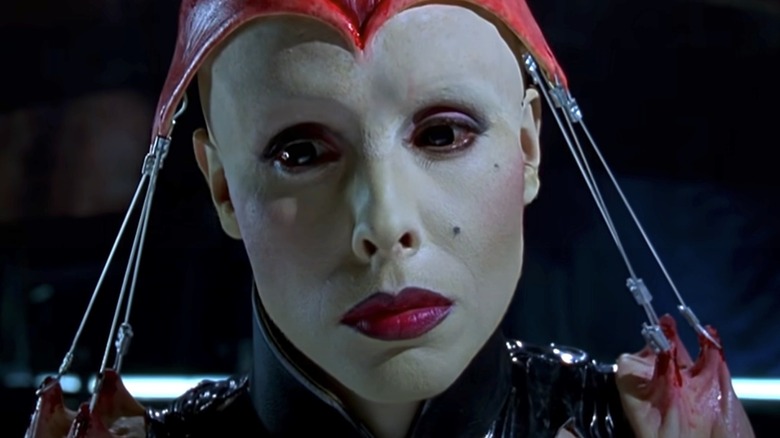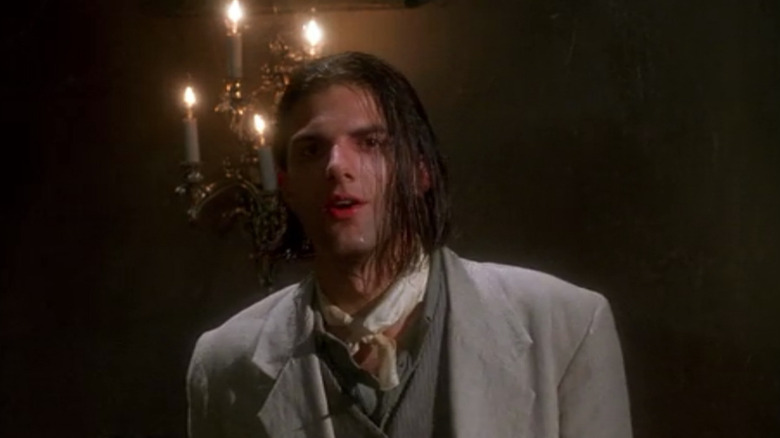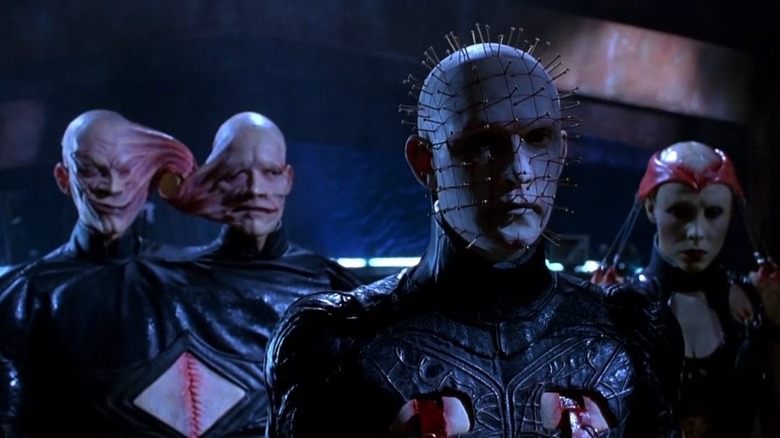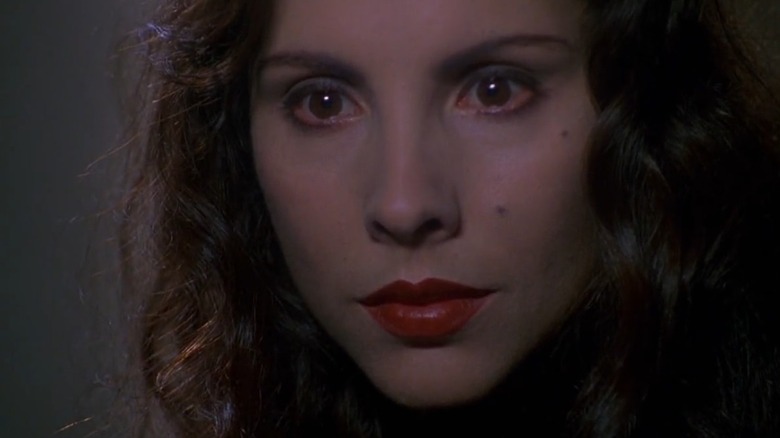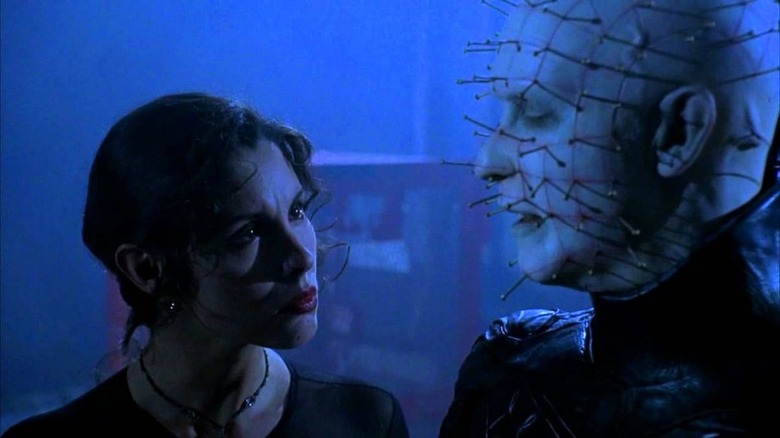The Most Underrated Hellraiser Movie That Deserves A Rewatch
"Hellraiser" still makes us bleed after 35 years of beautiful suffering. Clive Barker's masterpiece, adapted from his novella "The Hellbound Heart," gave us Pinhead (Doug Bradley), Cenobites, and a twisted love story for the ages. You won't find many horror fans out there who dispute its status as a classic.
The same can't be said about the majority of the sequels. In fact, the "Hellraiser" franchise is a missed opportunity all things considered, but that doesn't mean there aren't some admirable entries hidden in the shadows. "Hellraiser: Bloodline," the fourth movie in the series, is when the franchise started going downhill for most fans — even though it's an overlooked gem that deserves to be revisited for Adam Scott's brief appearance alone.
"Hellraiser IV: Bloodline" is by no means a perfect movie — it's actually very flawed. Per IMDB, the original director removed his name and adopted the infamous Alan Smithee moniker as a result of its shortcomings. All that aside, though, "Hellraiser: Bloodline" is still a fascinating sequel that scores points for its admirable attempt to go above and beyond. With that in mind, let's revisit this unsung treat that transcends time and space.
The road to Hellraiser: Bloodline was paved with good intentions
"Hellraiser: Bloodline" was supposed to take the series to the next level. Writer Peter Atkins, director Kevin Yagher, and Clive Barker set out to make a sequel that felt different from the others, while still remaining true to the "Hellraiser" mythos. If everything went according to plan, it would have been the most epic "Hellraiser" movie of the bunch. But as history has shown, "Hellraiser: Bloodline" had its soul torn apart by studio executives who wanted more monsters and gore.
"Hellraiser: Bloodline" chronicles the misfortunes of a cursed family, not unlike the original movie. The story follows the Lemarchand clan over three generations as a reincarnated toymaker/scientist attempts to right the wrongs of his ancestry. In short, his family is responsible for the creation of the iconic puzzle box that unleashes Hell. The story begins in 18th-century France, moves to present-day New York, and culminates in the year 2127 — on a space station. The film aimed for the cosmos, but it was too good to be true.
Paul Kane's terrific "The Hellraiser Films And Their Legacy" notes that the sequel initially clocked in at 110 minutes and Pinhead didn't make an appearance for the first 40. This didn't please the executives at Dimension Films, who demanded cuts, rewrites, reshoots, and more Pinhead. The ambitious, time-spanning story was condensed into an 85-minute movie that fails to live up to the creators' original vision. Still, you can still see what they were trying to achieve, which goes a long way.
Hellraiser: Bloodline is an ambitious misfire, but it's not without merit
"Hellraiser: Bloodline" isn't the film it was meant to be, but the ambition of its creators is still tangible in every frame. It would have been nice to spend more time in each time period and delve deeper into the story, but the centuries-spanning adventure still boasts plenty of scope. It's easy to dismiss "Hellraiser: Bloodline" as just another horror sequel that goes to space, but the terrifying tale justifies a trip to the stars. Plus, the space setting is one small part of the movie, so don't go comparing it to "Jason X" and "Critter 4."
Additionally, "Hellraiser: Bloodline" is one of the few sequels that captures the spirit of the original film. It's a mythology-driven nightmare that explores the box's power and how it corrupts people. The 18th-century scenes are also loaded with all of the occult elements, debauchery, and grotesque imagery that could only come from a project involving Clive Barker. The film didn't get to realize these elements to their fullest potential, but the aesthetics we want from a "Hellraiser" movie are still present.
Despite being the victim of studio interference, "Hellraiser: Bloodline" is surprisingly coherent and tells a good story. Even Barker has some nice things to say about the finished product. "I think there are some fine things in Hellraiser IV actually," he told SFX (via Clive Barker). "There are some things that return almost to the tone of the first one. It's uneven, no question, but overall I prefer it to number three."
Hellraiser: Bloodline introduces another great villain
Pinhead is the face of this franchise, but "Hellraiser: Bloodline" brings in another demon who makes an impact. Angelique (Valentina Vargas), a princess of Hell, is the dark heart of the movie, using her powers of persuasion to try and manipulate Lemarchand's present-day relative, John Merchant (Bruce Ramsay), into building the ultimate portal between Hell and the human world.
Given that the "Hellraiser" franchise was founded on strong female villains, Angelique is a fitting character. Like Julia Cotton (Clare Higgins), she's glamorous, alluring to the men she encounters, and utterly sadistic. At the same time, she's a unique and fully formed character who gives Pinhead a run for his money.
The only downside is not getting to see more of her backstory. The original script gives Angelique a complex relationship with the Lemarchand/Merchant clan that dates back to the 18th century. Furthermore, Angelique's relationship with Pinhead is ill-defined in the finished movie, though it does tease a history between them that would have been fun to explore on the screen. Alas, "Hellraiser: Bloodline" leaves it up to the viewer's imagination to fill in the blanks.
Hellraiser: Bloodline provides some form of closure
"Hellraiser: Bloodline" should have been the end of the franchise. It was the last movie to feature any major involvement from Clive Barker and it shows. Afterward, the sadistic saga essentially became a series of standalone movies that shoehorned "Hellraiser" lore into random horror scripts that were purchased by Dimension Films. The quality dipped and the suffering was, indeed, legendary.
However, "Hellraiser: Bloodline" wraps things up quite serviceably. In addition to learning the history of the dreaded Lemarchand's Box, the movie kills off Pinhead and his followers. It's a satisfying conclusion to the natural story that began with Barker's classic from 1987. If the saga ended here, it could have been one of the rare long-running horror franchises that didn't bring villains back from the dead just for the sake of it. If anything, the "Hellraiser: Bloodline" legacy has probably been more tainted by the less-than-stellar sequels that came afterward, as opposed to the quality of the film itself.
It's true that "Hellraiser: Bloodline" didn't live up to its potential, but it's the last movie in the original series that actually tried to give Pinhead and his crew a satisfying farewell. And while it will go down in history as a missed opportunity, there are far worse ways to say goodbye.
